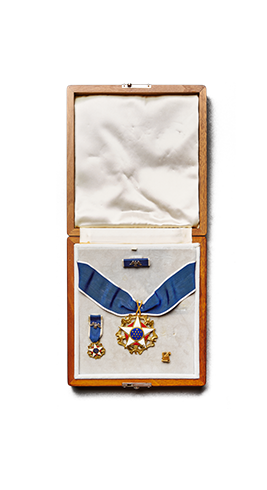Atlanta in 50 Objects
A pink pig and a renegade cow. A movie prop and a Coke bottle. A Pulitzer Prize–winning book and a Nobel Prize–winning icon.
How do you tell the story of Atlanta in 50 objects? We decided the best experts were Atlantans themselves—residents who cheer the Braves and rue I–285 rush-hour traffic, who understand how Civil War losses and Civil Rights victories together helped forge the city’s unique identity. Atlanta History Center asked the public to submit what objects they think best represent their town. The parameters were broad: an object could also be a person, a place, an institution, or an idea. After receiving hundreds of submissions, History Center staff assembled a collection of fifty pieces that represent the themes identified by the public. In addition to items from our own collections, we have partnered with many local institutions and individuals to gather artifacts from around the city to tell this community–driven story.


Ralph McGill
Ralph McGill was the Pulitzer Prize-winning editor of the Atlanta Constitution.
After working as sports editor for the Nashville Banner, McGill moved to Atlanta in 1929 to become assistant sports editor of the Constitution. Shifting from sports to news in the 1930s, McGill’s coverage of serious events led to his promotion to executive editor in 1938.
McGill used his position to highlight the effects of segregation, earning him the nickname “Conscience of the South.” For much of his career, McGill was a lone voice, breaking the white code of polite silence about racial discrimination and segregation. Angered readers sent threats to McGill, some burning crosses on his lawn at night and firing bullets into his home.

Ralph McGill in his office at the Atlanta Constitution, ca. 1960. Kenan Research Center at Atlanta History Center, Bill Wilson Photographs